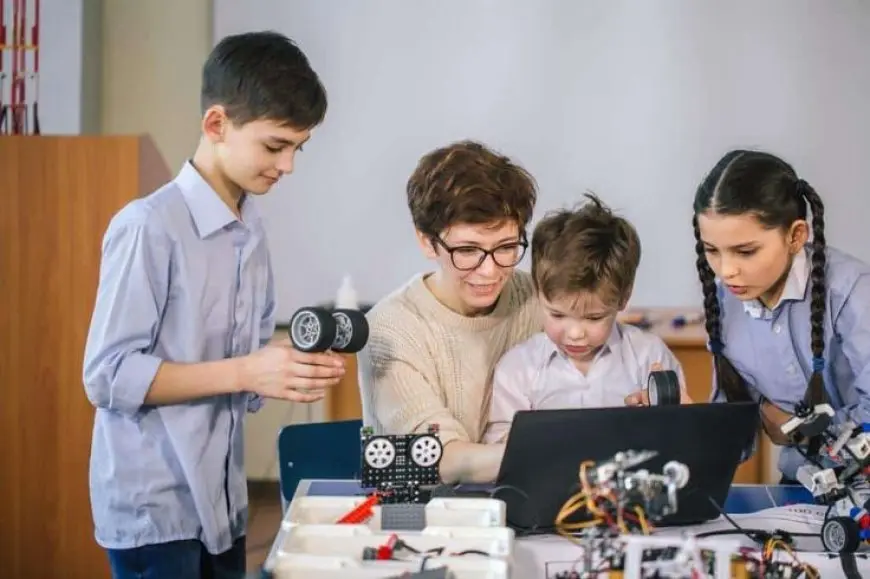The Benefits of Learning Coding for Kids
The Benefits of Learning Coding for Kids

In today's increasingly digital world, coding is becoming an essential skill. As technology continues to evolve, understanding the basics of programming can provide children with a range of valuable benefits, not just in terms of future career opportunities but also for developing important life skills. Introducing kids to coding at an early age opens up numerous doors for creativity, problem-solving, and critical thinking. Here are some of the key benefits of learning coding for kids.
Encourages Problem-Solving Skills
Coding is all about breaking down complex problems into smaller, manageable parts. When kids learn to code, they are constantly working through problems and figuring out how to overcome challenges. This process helps them develop strong problem-solving skills, as they learn how to think critically and logically. By figuring out how to make a program work, children enhance their ability to approach challenges with a structured and solution-oriented mindset.
Enhances Creativity
Coding provides kids with the opportunity to create their own digital world. Whether they are building a simple game, designing a website, or developing an app, coding encourages children to use their imagination and think creatively. By learning coding, kids gain the ability to bring their ideas to life, which boosts their self-confidence and gives them a sense of accomplishment. This creative process fosters innovation and helps kids see endless possibilities for what they can achieve.
Develops Logical Thinking
At its core, coding is about logic. It involves understanding how to give a computer specific instructions to perform tasks in a particular order. Learning to code encourages kids to develop logical thinking and understand the sequence of actions needed to achieve a desired outcome. This structured approach to thinking has applications beyond coding and can benefit kids in subjects like mathematics, science, and even everyday decision-making.
Boosts Future Career Opportunities
As technology becomes more embedded in all areas of life, the demand for people with coding skills continues to rise. By learning to code, kids are preparing themselves for a future in a variety of tech-driven fields such as software development, artificial intelligence, web design, and game development. The earlier kids are introduced to coding, the better positioned they will be to pursue these lucrative and rewarding careers as they grow older.
Improves Collaboration and Teamwork
Although coding can be done individually, many coding projects require collaboration. When kids work together on coding assignments, they learn how to communicate effectively, share ideas, and solve problems as a team. Working on group coding projects helps kids develop important teamwork and collaboration skills that are valuable in both academic and professional environments.
Promotes Persistence and Patience
Coding often requires trial and error. It’s common for a program to not work as expected on the first try. Learning to code teaches kids how to be persistent and patient, as they must troubleshoot problems, make adjustments, and try different solutions until they get it right. This process of learning from mistakes and persevering through challenges is an important life lesson that can help children in all areas of life.
Teaches Attention to Detail
Coding requires a high level of attention to detail. A single typo or missing character in the code can prevent the program from running correctly. As kids learn to code, they become more attuned to the details, learning to be meticulous and precise in their work. This skill can translate to greater attention to detail in other areas, whether it's completing homework assignments or paying attention in class.
Fosters Independent Learning
Coding encourages independent learning, as kids often need to figure things out on their own. With numerous online resources, tutorials, and coding platforms available, kids can take control of their own learning journey. This self-directed learning builds confidence and independence, as kids learn how to seek out answers, troubleshoot problems, and explore coding concepts at their own pace.
Helps with Mathematical Understanding
Coding and math are closely related. Many coding concepts, such as algorithms and logic, are rooted in mathematical principles. By learning to code, kids develop a stronger understanding of mathematical concepts, such as patterns, sequences, and problem-solving techniques. This connection between coding and math helps children build a solid foundation in both subjects, which is valuable for their academic success.
Improves Computational Thinking
Computational thinking is the process of thinking in a structured way to break down a problem into manageable steps, just like coding does. It involves recognizing patterns, designing algorithms, and analyzing solutions. This type of thinking improves kids' ability to solve problems in a systematic and organized manner, which can be applied to many other academic subjects and everyday situations.
By learning coding, children gain more than just technical skills—they develop essential life skills such as creativity, problem-solving, patience, and logical thinking. With its wide range of benefits, coding provides kids with the tools they need to succeed in both the digital world and in life.







